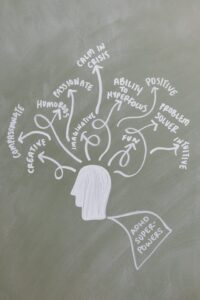Attention-Deficit/Hyperactivity Disorder (ADHD) is one of the most widely recognized yet misunderstood conditions, especially when it comes to children. While the awareness of ADHD has grown over the years, many misconceptions persist. These myths can lead to confusion, stigma, and a lack of proper support for children who struggle with ADHD. In this article, we will debunk eight common myths about ADHD and provide the facts behind them.
Myth 1: ADHD Isn’t Real—It’s Just Bad Parenting
Fact: ADHD is a well-established neurodevelopmental disorder. It is not a result of poor parenting or bad behavior. Leading medical organizations like the American Psychiatric Association (APA) and the Centers for Disease Control and Prevention (CDC) recognize ADHD as a legitimate condition. Children with ADHD have differences in brain structure and function, affecting their ability to focus, control impulses, and regulate emotions. While parenting style can influence how a child with ADHD behaves, the root causes are neurological, not parental shortcomings.
Myth 2: All Kids with ADHD Are Hyperactive
Fact: While hyperactivity is a common symptom of ADHD, not all children with the condition are hyperactive. ADHD is divided into three subtypes:
- Predominantly Inattentive Type: Children with this type of ADHD struggle with focus, organization, and attention to detail but may not show obvious hyperactive behaviors.
- Predominantly Hyperactive-Impulsive Type: These children display behaviors like restlessness, fidgeting, and acting impulsively.
- Combined Type: A child with this subtype exhibits both inattention and hyperactivity/impulsivity.
It’s important to remember that every child with ADHD presents differently, and hyperactivity is not always a defining characteristic.
Myth 3: ADHD Is Overdiagnosed
Fact: ADHD is often underdiagnosed, especially in certain populations. Although some believe that ADHD is overdiagnosed, research shows that it is more commonly missed, especially in girls, who tend to show more inattentive symptoms than hyperactive ones. Additionally, minority children are less likely to receive an ADHD diagnosis due to various cultural and socioeconomic factors. The growing recognition of ADHD’s diverse presentations has helped improve diagnosis rates, but it’s still not always identified in children who need help.
Myth 4: Kids with ADHD Just Need to Try Harder
Fact: ADHD is not a matter of willpower or effort. Children with ADHD face real challenges due to differences in brain structure and chemistry that impact their ability to focus, regulate their behavior, and control impulses. While children with ADHD can succeed with the right strategies, therapy, and sometimes medication, it is not as simple as "trying harder." These children require tailored support to help them manage their symptoms effectively.
Myth 5: ADHD Only Affects Boys
Fact: Although ADHD is diagnosed more frequently in boys, girls can also have ADHD. However, the symptoms in girls may look different, which can lead to underdiagnosis. Girls with ADHD often display more subtle symptoms, such as daydreaming, disorganization, and inattentiveness, rather than the disruptive behavior commonly seen in boys. As a result, ADHD in girls is often missed or misunderstood, which can lead to struggles in school and at home that go unaddressed.
Myth 6: Medication Is the Only Treatment for ADHD
Fact: Medication is a widely used and effective treatment for ADHD, but it is not the only option. Behavioral therapy, cognitive behavioral therapy (CBT), parent training, and educational interventions are also crucial for helping children manage their symptoms. Therapy can help children develop coping strategies for focus, organization, and emotional regulation. Additionally, lifestyle changes, such as improving sleep hygiene, maintaining a balanced diet, and incorporating physical activity, can complement medical treatment. A comprehensive treatment plan tailored to the child’s needs often yields the best results.
Myth 7: ADHD Is Caused by Too Much Sugar or Screen Time
Fact: While sugar and screen time can certainly affect children’s behavior, they are not causes of ADHD. ADHD is a neurodevelopmental disorder, primarily influenced by genetic and environmental factors, such as prenatal exposure to toxins or low birth weight. However, certain lifestyle factors, including poor diet and excessive screen time, may exacerbate the symptoms of ADHD in children who are already predisposed to the condition. Healthy habits, such as balanced nutrition, regular exercise, and screen time management, can help children with ADHD better regulate their behavior and focus.
Myth 8: Kids Will Outgrow ADHD
Fact: ADHD does not typically go away as children get older. While some children may experience a reduction in hyperactivity or impulsivity as they enter adolescence, the core symptoms of inattention, impulsivity, and difficulty with executive functioning often persist into adulthood. In fact, about 60% of children with ADHD continue to experience symptoms as adults. However, the severity of symptoms may change over time, and individuals with ADHD can learn strategies to manage their symptoms effectively throughout their lives.
Why Debunking These Myths Matters
Understanding the facts about ADHD is critical for several reasons:
- Prevention of Stigma: Myths about ADHD can create unnecessary stigma and shame for children and parents. By educating ourselves and others, we can reduce negative judgments about children with ADHD.
- Access to Appropriate Treatment: Misinformation about ADHD can delay or prevent children from receiving the support they need. For example, the myth that children just need to try harder can prevent parents from seeking professional help, leading to unnecessary struggles.
- Better Support for Children: When parents, teachers, and caregivers understand the reality of ADHD, they are better equipped to provide children with the support they need to thrive. With proper diagnosis and treatment, children with ADHD can succeed in school, home life, and social settings.
How to Spread Awareness and Support
Here are a few steps you can take to help support children with ADHD:
- Educate Yourself and Others: Read up on ADHD, share accurate information, and speak up when you encounter myths or misinformation.
- Advocate for Your Child: Partner with teachers, therapists, and doctors to create a comprehensive treatment plan tailored to your child’s specific needs.
- Celebrate Strengths: Children with ADHD often have many strengths, including creativity, energy, and the ability to think outside the box. By focusing on these qualities, parents can help build confidence and resilience in their children.













